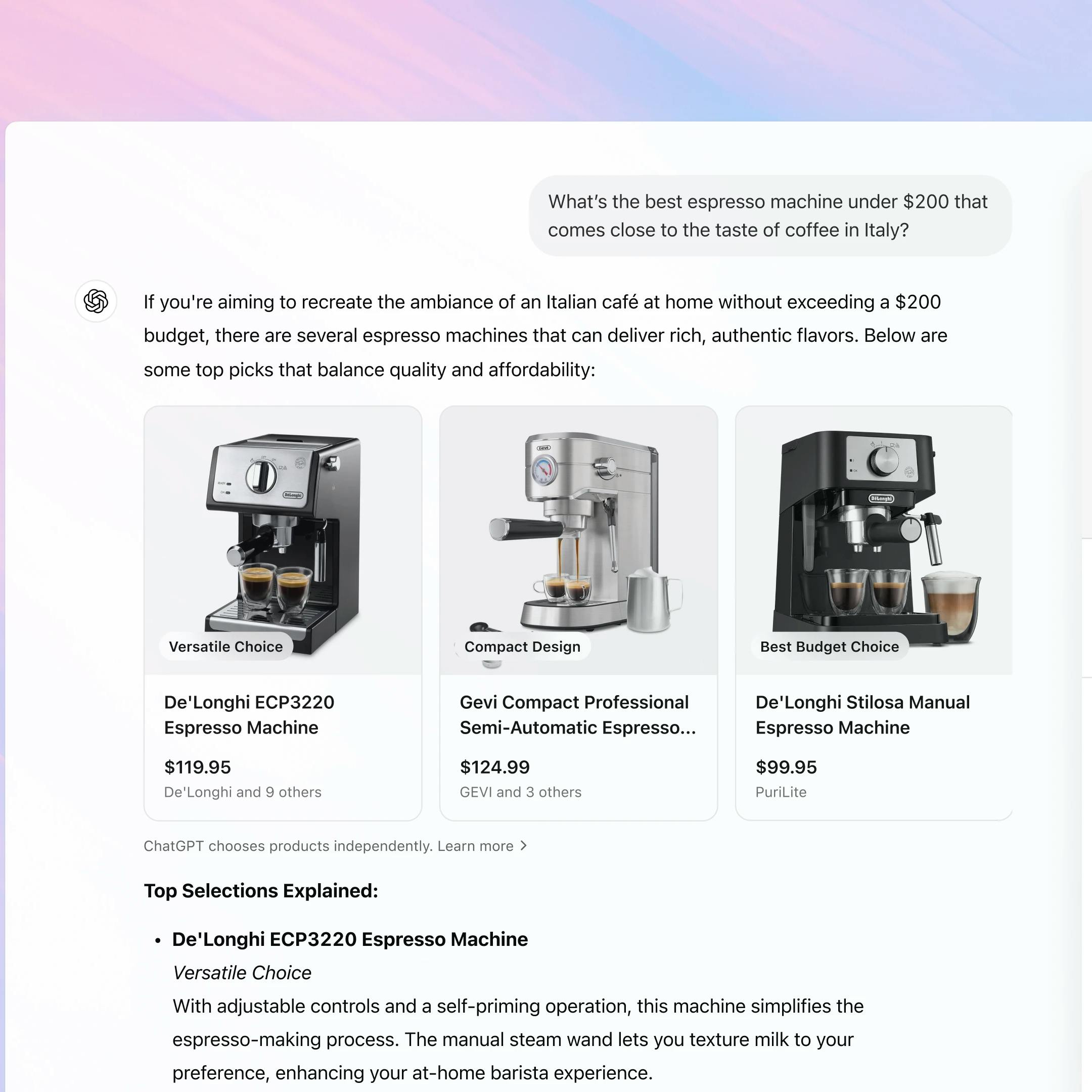AI is Changing How Your Customers Find You
80% of your future customers may never Google you. Here’s how to adapt.

Most conversations about AI in eCommerce focus on productivity: faster content creation, better workflows, and smarter automation.
But what if we told you the real shift isn’t about how you work—it’s about how your customers shop?
In this episode of eCom Buzz, SwiftOtter CEO Joseph Maxwell shares a firsthand story that reveals just how quickly AI is replacing traditional search behavior—and why most eCommerce brands aren’t ready.
🎥 Prefer to watch the video? Check it out here
The aha moment: concrete, chaos, and clarity
Our Founder and CMO, Joseph, was mid-project helping a friend build stairs for their deck. Concrete was setting. Hands were filthy. And one key step was fuzzy in his memory.
So he picked up his phone and typed:
“How do I know when to float wet concrete?”
Google responded with what you’d expect: Reddit threads. Opinionated forums. YouTube videos with long intros and unskippable ads.
In a moment where seconds mattered, it completely failed.
So he switched to ChatGPT.
Same query. Instant answer. No fluff. No ads. No distractions.
It was a throwaway moment—until later. Then it hit:
This is exactly how product discovery is changing for your customers.
Customers don’t want content. They want conclusions.
Today’s shoppers—especially younger, AI-native ones—don’t want to dig through blog posts or watch 8-minute videos. They want answers. Fast.
And increasingly, they’re turning to tools like ChatGPT, Gemini, and Claude instead of traditional search engines.
What does that mean for your brand?
It means you might be creating content… and still not showing up where discovery is happening.
Grandstand Glass is already ahead
One SwiftOtter client, Grandstand, ranks at the top of AI-generated answers for queries like best glassware imprinting for breweries.
They didn’t get there by accident.
They built content that AI tools can understand, structure, and cite.
Their competitors? Still playing the old SEO game.
This is the new competitive edge:
If you show up in AI answers, you win the click before there even is a search result.
SEO isn’t dead—but it is evolving
Traditional search engines are still here—and still critical. But AI search tools are fast becoming the first stop for product discovery.
And AI tools don’t behave like search engines.
They summarize, scrape, and cite.
They might pull from your content… or your competitor’s.
And the customer may never even visit your site.
That’s a fundamental shift in the discovery path—and a major threat to how most eCommerce brands currently approach visibility.
4 moves to win visibility in the AI-first era
Here’s how to respond to the shift, today:
1. Start using AI
You can’t optimize for what you don’t understand.
The best way to optimize your content for AI-powered discovery is to experience what your customers see when they ask questions. Using ChatGPT, Claude, and Gemini will provide an understanding of how your customers now get answers.
Here’s why we recommend getting familiar with these 3 tools in particular:
- ChatGPT is the best all-around assistant. Fast, structured answers and solid research summaries. Great for simulating what the average consumer sees.
- Gemini integrates tightly with Google’s ecosystem—so if your presence on Google is strong, this tool will reflect it. It also has the best multimedia pull.
- Claude writes like a human. It’s warm, nuanced, and insanely good at long-form content and reasoning. Perfect for testing tone or product messaging.
The takeaway: These tools interpret your brand differently.
If you don’t know how they describe your products today, you can’t improve what they’ll say tomorrow.
2. Think long-term, not short-term
This isn’t a hack.
Winning in AI-first discovery means creating structured, trustworthy content that AI wants to use.
Educational content, product specs, clear reviews, and customer-focused answers are more important than ever.
3. Understand that SEO is mostly GEO
If your site already has high-quality SEO fundamentals—great UX, fast load times, strong copy—you’re on the right track.
But now, think about how that content gets parsed.
Is it readable, structured, and factual enough to be referenced by AI tools?
4. Don’t sleep on Bing
When ChatGPT doesn’t have an answer, it turns to Bing.
And Microsoft is positioning Bing as the research assistant of the AI era.
It’s not about user volume anymore.
It’s about influence—especially as tools like ChatGPT lean on Bing to fill in their gaps.
The Future of Search is Already Here
80% of users still start with traditional search today—but that number is dropping.
And it won’t reach zero, but it doesn’t have to.
All it takes is enough customers skipping search and going straight to AI for your traffic to decline sharply—and for your competitors to grab the spotlight.
What’s Next?
Next on eCom Buzz, we’ll dive deeper into how to optimize your eCommerce site for AI indexing, including:
- Tactics to structure your content for large language models
- How to build product pages that show up in ChatGPT, Gemini, and Claude
- Tools and frameworks to test your AI visibility
Until then, watch the full episode below and shoot us any questions you may have. If you’re not already adapting to AI-first discovery, now is the time.
Ready to Make AI Work for Your Business?
If you’re exploring AI tools (or just trying to get real value from the ones you already have), we’d love to help you map out a smarter strategy.

